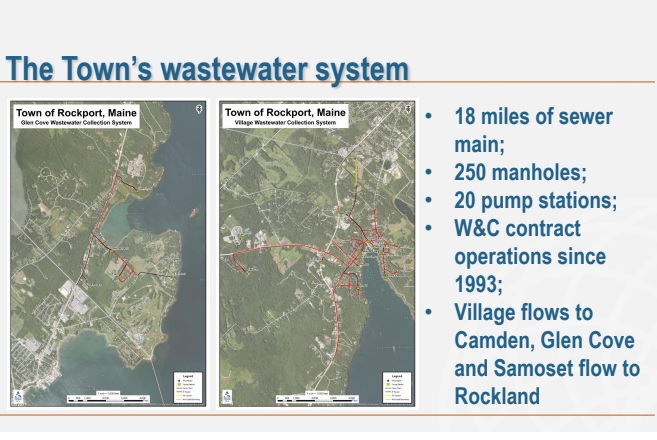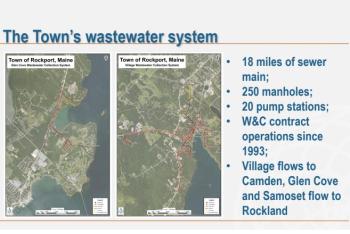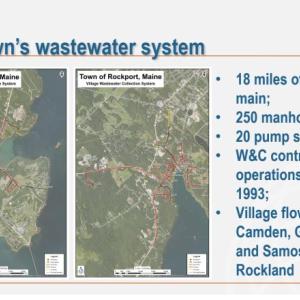Camden demands wastewater bill payment from Rockport — or court for unjust enrichment
CAMDEN — Relations between Camden and Rockport took a dive Monday evening when the Camden Select Board voted unanimously to notify Rockport its back payments for assessed sewer bills are due, and to produce within 90 days a plan that outlines how Rockport will withdraw its dependence on the Camden sewer system.
Towards the end of a regularly scheduled March 21 meeting, Town Manager Audra Caler described the current impasse as, “a fundamental misalignment of values and needs.”
In addition to approving a letter be sent to Rockport demanding $143,323 to cover delinquent payments, or face a claim of unjust enrichment filed at the Knox County Court House, the Camden Select Board also decided that it no longer wants Rockport’s wastewater. (Unjust enrichment: when one party is enriched at the expense of another in circumstances that the law sees as unjust.)
The Camden Select Board also threatened to inform economic development agencies that any project funding Rockport pursued in relation to its own sewer system expansion would be informed that such projects had no guaranteed future reliance on Camden’s sewer system.
While the topic was hotly discussed in Camden, it received cursory public attention in Rockport, which has not talked about the issue at length in open meetings. Rockport’s Select Board had also convened for a regularly scheduled meeting March 21, at the same time Camden was holding its own meeting.
Meeting first as Rockport’s Wastewater Commissioners, Rockport’s Select Board gathered at 5 p.m. behind closed doors for an executive session but did not identify the topic of discussion.
During the public portion of the open meeting following the executive session, the only reference to the brewing storm was Rockport Town Manager Jon Duke’s statement, “there is an item on Camden Select Board regarding payment of wastewater bills by the Town of Rockport.”
He then asked the Rockport Select Board to set a future date to appoint two representatives from the Select Board to serve on the sewer system administering committee for the interlocal agreement with the Town of Camden.
Both towns feel aggrieved with their individual circumstances regarding the fiscal business of how Rockport eliminates its waste.
Currently, Rockport collects waste from a network of pipes in Rockport Village, and along partial distances of routes 90 and 1, running it first through the town’s system, and then over to Camden’s treatment plant. There, it joins with Camden’s wastewater, is processed and treated, and sent down into Camden Harbor and Penobscot Bay.
This has been the arrangement since 1989-90. The section of sewer pipes from Pen Bay Medical Center and Glen Cove directs waste to the Rockland sewer system.
The Penobscot Bay Area YMCA and the transfer station, on Union Street, have their own separate sewage pipe that ties into the Camden system.
Rockport also sends waste from its neighborhoods of Glen Cove and Pen Bay Medical Center complex to the Rockland sewer system. Rockport’s interlocal agreement with Rockland is due for renewal in 2022.
According to Camden Town Manager Audra Caler, Rockport is in arrears to Camden by $143,323. That number represented two payments: $66,217, which was due November 2021, and $77,106, due February 28, 2022.
Rockport and Camden entered an inter-local agreement in 1989, with a renewal date of February 2020. But the towns failed to agree on new terms, and have been operating under the old agreement for the last two years. Various meetings have been held between town managers and select board members from each town, but negotiations stalled.
Rockport set its own budget on what it would pay Camden, while Camden assessed a different rate. In November, Rockport said publicly that Camden had rejected its proposed agreement.
In that two -year period, Camden embarked on a $14.5 million sewer system upgrade and assigned 12 percent of that cost, approximately $1.2 million, to Rockport. When Rockport balked at the capital improvement fee, Camden said it would pay it, but would bill Rockport in quarterly installments.
In 2020, after Rockport ratepayers were slammed with excessively high wastewater bills(attributed to higher water use of ratepayers, increased inflows to the town’s sewer system from infiltration, and the infrastructure improvements in Camden), the Rockport Select Board Chair said in a public letter: “Camden charges Rockport users the same rate it bills its Camden customers. Rockport does not use the totality of the infrastructure that this charge is based on. We have had several meetings with Camden to discuss these findings and shared the discrepancy with the Camden Town Manager, Wastewater Superintendent, and members of the Select Board. We are continuing to work with Camden to remedy this situation as quickly as possible. However, the approved Wastewater Budget for Fiscal Year Ending 2022 represents a calculated reduction on the fair user rate we have proposed to Camden.”
Camden was fined by the Maine Dept. of Environmental Protection in November 2021 for six years of sanitary sewer overflow caused by excess inflow and infiltration into the collection system, and warned that it was time to stem the problem.
And Rockport, on its own time and penny, explored the costs of building its own municipal sewer system. In November, the Rockport Select Board approved spending $64,000 on a Route 90 sewer extension study to run pipes to West Rockport an building its own sewage treatment plan.
The concerns of Camden of 1990 are the same of today, Caler told the Camden Select Board on March 21. They include:
Water quality in Camden Harbor;
Infiltration issues in collection system that cause sanitary sewer overflows in heavy rain events;
Exceeding permit levels allowed by the Maine Dept. of Environmental Protection;
Treatment levels applied to wastewater and the quality of effluent released into the harbor;
And, Camden being unable to expand sewer service in strategic locations in town, which could be compounded by increasing flow from Rockport.
“You could argue it is still an issue now that they [Rockport] are sending us increasingly more flow,” she said.
Caler read a prepared statement concerning Camden’s perspective on the issue:
“It [the interlocal agreement] was premised on that Rockport ratepayers were being charged the same as Camden ratepayers, and then assessed an additional quarterly payment of $2.25 per 100 cubic feet of actual metered sewage exceeding the customer count times 1,000 cubic feet.
“Now, I’m bringing that up because that is something that we’ve never really applied to rates, that last part. It has always just stayed at — what the Camden rate was, was for Rockport, as well, and that is what their ratepayers paid.
“Given Rockport’s recent escalating rates, there was a desire by their board in 2021, and political leadership in Rockport, to find a quick and easy solution to the problem.
“Instead of them looking to the high cost of internal operations, better understanding the financial impact of expanding their system and how this impacted their debt service payments or their own rates, or even how their interlocal agreement with Rockland played into the calculation of their rates, they focused on —hyper-focused is how I would put it — on the 12.4 percent of their expenses that can be attributed to the interlocal agreement with Camden and the fees that Camden levied.
“So this led to Rockport disregarding the environmental and financial issues that really underpinned the original 1989-90 interlocal agreement, which was pretty fundamental to Camden ratepayers and taxpayers in agreeing in the first place to accept and treat Rockport’s wastewater, both back in 1990 but also into the future.
“They did this in favor of unilaterally refashioning an interlocal agreement and a method of assessing user rates.
“The agreement proposed by Rockport counter to the agreement, either renewing the 1990 agreement or them working with us on an agreement very similar in the issues that it addressed in 2020 — it was updated and very similar in following all the considerations that everybody agreed were important in 1990, they wanted to set rockport’s user rate on what they determined to be portions of camden’s collection system and administrative and operational expenses that only applied to rockport.
“The problem is, even by the terms of Rockport’s proposed agreement in the application of their own logic, the user rate Rockport arrived at and unilaterally decided to pay Camden in the first quarter of 2022 is incorrect, because it represents an 89 percent reduction in user rates for Rockport ratepayers over what is paid by Camden ratepayers. [Rockport paid Camden $9,000.]
“And while this underpayment, or nonpayment, of wastewater is serious, I would say it is just representative of a much more serious and fundamental issue between the towns. That is there is a disregard of promises made in the past to address the ongoing impacts of environmental and financial burdens placed on Camden in accepting and treating Rockport’s waste.
“I think these burdens are only going to increase as the cost to treat wastewater rise.”
By the meeting’s end March 21 in Camden, there was a barrage of criticism on Rockport, with Select Board members lamenting the lack of negotiation.
Camden Select Board member Sophie Romana said she had seen no cooperative spirit from Rockport.
But, they also decided that Camden’s environmental issues related to the sewer would increase with more Rockport wastewater.
“Camden does not have additional capacity and cannot accommodate,” said Camden Board Chair Robert Falciani. “We don’t want anymore.”
Reach Editorial Director Lynda Clancy at lyndaclancy@penbaypilot.com; 207-706-6657





























